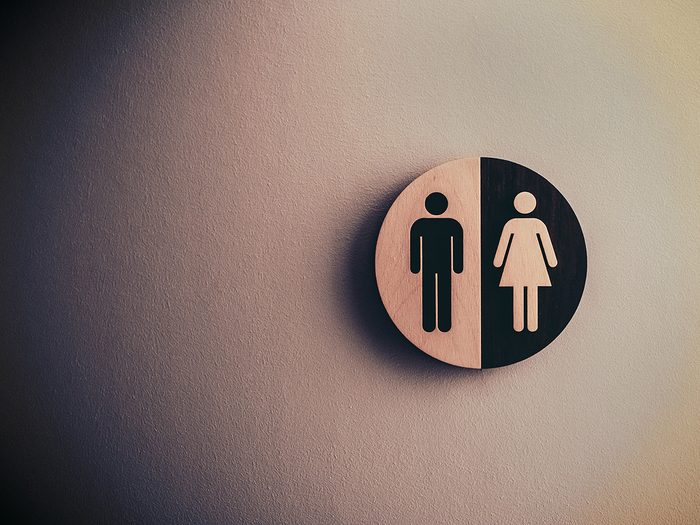
Whether you’re constipated
Uh-huh, we feel it immediately. Your stomach is firm to the touch. But it’s OK—we’ll get things moving for you, and teach you some self-techniques, too (like tracing the words “I love you” into your stomach). Here are natural remedies for constipation.

If your allergies are flaring
You have pressure points over your eyes, forehead, cheeks, and even around your jaw. When these are tender and inflamed, and the quality of the tissue feels different, we know you might be dealing with pesky allergies, says Melanie Brunette, Associate Spa Director at Canyon Ranch wellness resort in Lenox, MA. “However, the tenderness could also be due to muscular trigger points so we ask questions about any pain or problems you’ve been experiencing.” Lymph nodes in the chest, around the neck, and under the armpits will also be tender and swollen. (These are the worst Canadian cities for allergies.)
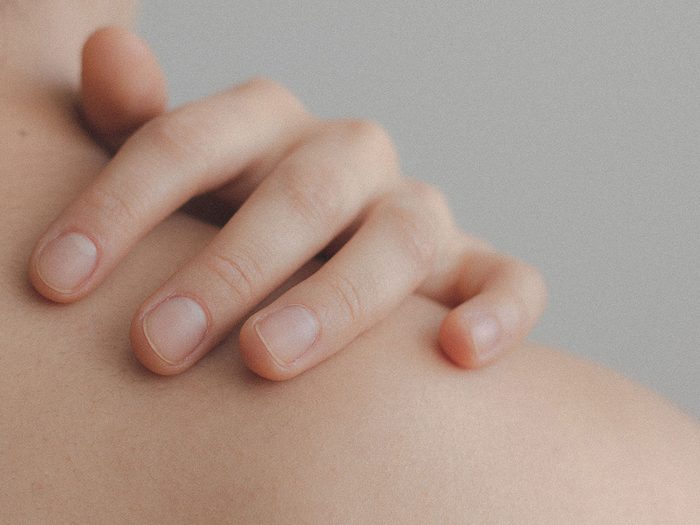
That you might have skin cancer
Massage therapists have our eyes on the back of your body. Although we’re not trained to detect skin cancer, we can spot irregularities in places you can’t. We’ve noticed bright red, oddly shaped spots behind the knees or on the back of the hip, and when we do, we’ll urge you to get it checked out. Clients have called us saying, “You may have saved my life.” (Here are the places you ignore when checking for skin cancer.)
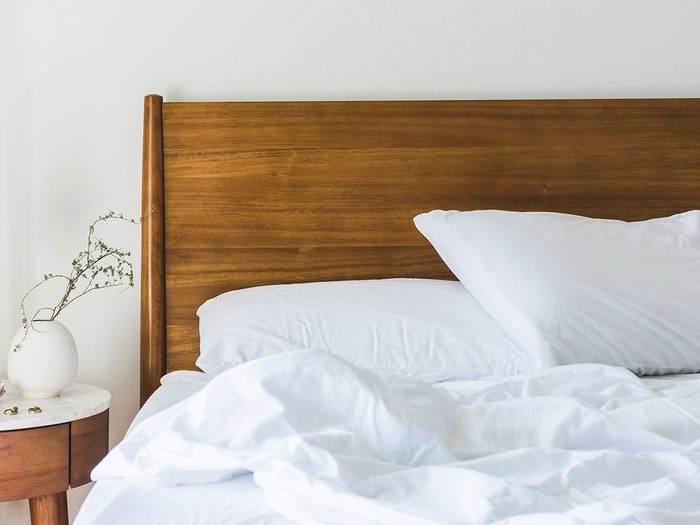
When you need a new pillow
We can tell when you’re sleeping on a pillow that’s wrong or too-old. This can throw off the alignment of your spine. There’s a lot of trial and error that goes into finding the perfect pillow. It should support the shoulder enough to not bunch up around your ears. Over time pillows should be turned around, fluffed, or replaced when their appearance gets a bit deflated or you no longer feel supported in your sleep. If your head is tilted down or up, it’ll put strain on your neck. And speaking of strain, we beg: Don’t sleep on your stomach. It places incredible pressure on your spine and neck. Sleep on your back or side. You can tuck a pillow between your knees or under your arms to be more comfortable. (Psst: Find out what your pillow personality is.)

If you’re prone to low back pain
We’ll know even if you don’t say so. When you lay on the table, we’ll check to see if one hip is higher than the other. That type of misalignment is caused by tightness in the low back, a result of prolonged sitting or poor posture, and usually results in pain. “It can also be caused by scoliosis,” says Brunette. When you’re on your back, we’ll “also check the curve of the lumbar spine,” noting how much space is between the table and your low back, she says. Sometimes too much belly weight can cause the stressed gap, which may also lead to aching. Don’t miss these reasons you have back pain.
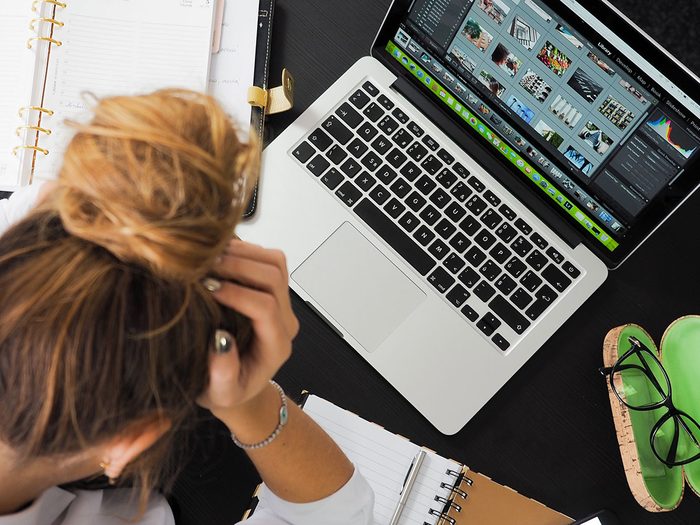
That you’ve been stressed out
We know you’re uptight if you’re a bit too chatty or can’t focus on relaxing. Plus, your body’s response to the massage will be different. Not all massage therapists believe that toxins are released during massage, but those who do take sweating or bad breath as signs that it’s the first time you’ve let loose in a while. (Did you know body pain can be a sign of stress?)
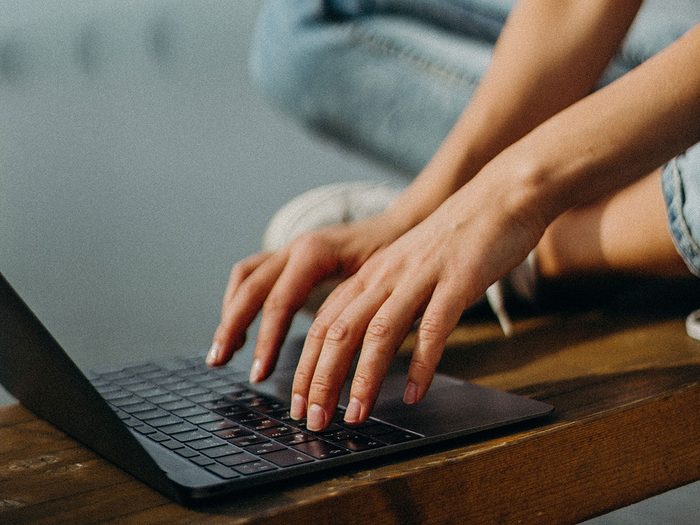
That you work at a computer
You’ll have a forward roll of the shoulders from looking at that monitor all day, and your back will be strained from remaining still for hours, says Brunette. However, “forward roll of the shoulders can be caused by many different things and many different professions,” she adds. “If a person works at a computer all day, they will often have low back issues as well as forearm problems, from using a mouse.”
Whatever the cause, quick stretches at your desk is an easy fix. Tense your shoulders up around your ears, squeeze for five to ten seconds, then drop and let gravity pull down your shoulders. Or, rotate in your chair like you’re driving a car in reverse, and hold for a count of 10.
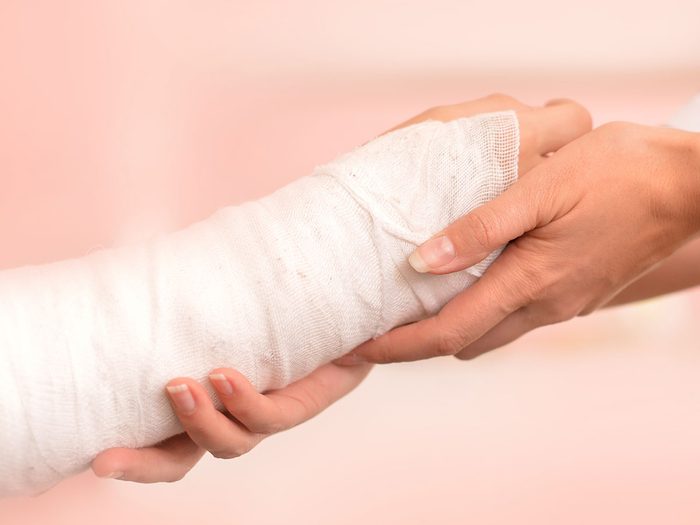
That you suffered injuries as a kid
We’ll notice the injury patterns even you may have forgotten about. We’ll see the aftermath of that childhood sledding accident, or that you once broke your leg, and then you’ll tell us about an injury a decade ago. A broken leg is often slightly shorter than the healthy leg, but when we examine you with both legs side by side, it’s obvious.
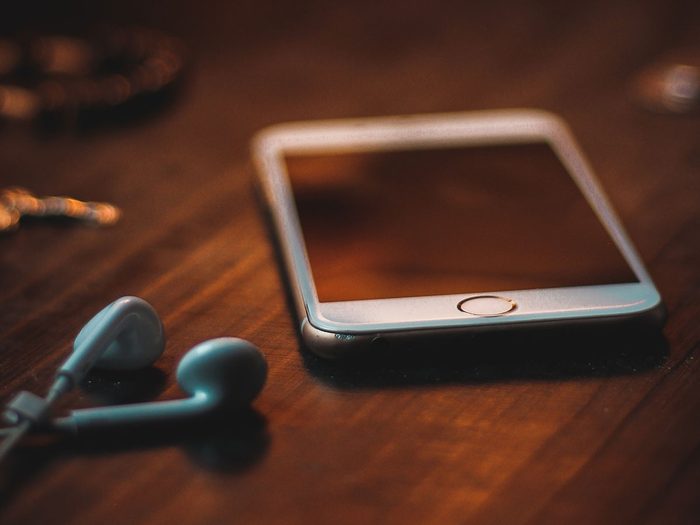
That you’re a textaholic
If we rub your shoulders, and you tell us it hurts or it’s tight, we wonder how much you’ve been texting. It’s easy to forget how long you hold your head in that downward position, but be sure to look up and stretch every so often, because that prolonged posture will cost you dysfunction and imbalance in the shoulders. (Here are strength-training moves for perfect posture.)
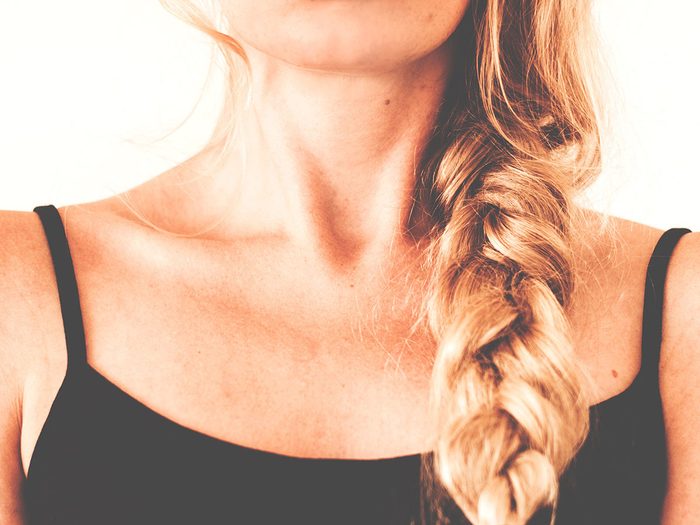
When you’re hormonal
Trigger points tell us a lot about your body. These are sensitive areas, which feel stickier, tense, hot, or rubbery to us—and painful to you. In our experience, we’ll know when you’re about to get your period or when you’re ovulating because of sensitive hormonal trigger points in your low back. A woman will ask, “What is that?” We’ll tell her she might be due for her period. Many times, she’ll laugh and say she got it that morning.

If you’re dehydrated
In our experience, we can tell if you haven’t been keeping up with your daily eight glasses of water. Trigger points in the upper back will be more tender when you’re dehydrated. Drink up, especially on massage day.

That you have physical challenges
Maybe you’re extremely right-side dominant. Or perhaps you carry your children on your left hip. Laura Allen, a massage therapist, educator, and author of Plain & Simple Guide to Therapeutic Massage & Bodywork Examinations, can always spot “women who carry their babies or a large purse and seem to have the chronic habit of always carrying it on the same side.” Whatever the reason, if we see you’re overdeveloped on one side and you’re a triathlete, for example, we’ll know you have trouble swimming in a straight line. Try doing single arm or leg exercises with the opposite arm during off-season to even yourself out.

If you travelled recently
We’re a touch-phobic society. If you spent hours in an airplane, especially with a seatmate who took up some of your space, you likely sat on only one of your glute muscles and curled yourself away. Your strained spots will have a twisted pattern, caused by a lot of pressure on one side. Likewise, if you have significant stress in your neck, we’ll guess you fell asleep without a pillow, likely hanging your head for hours.
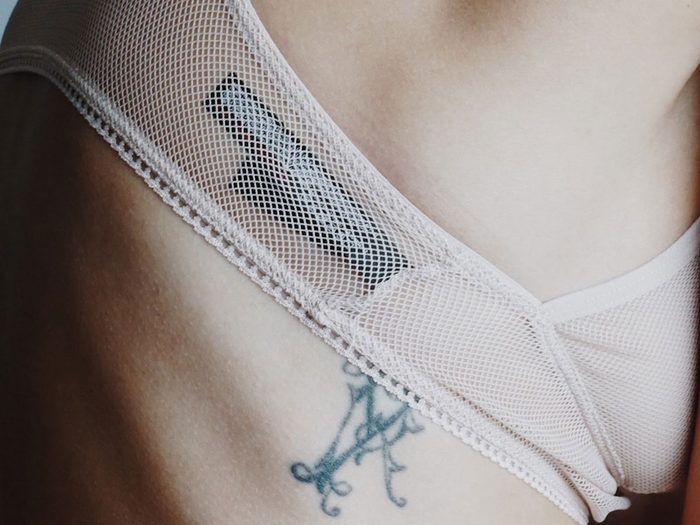
That your bra is too tight
Intimate, yes, but easy to tell. We can actually feel where a too-tight bra strap has been cutting across the shoulder blade, because the muscles above the scapula have tightened in response to the pressure. Same goes for a heavy backpack strap or purse—you’re overexerting that muscle, and it’s fighting back. (Check out the most comfortable bra worth the investment.)

When your job is taking a physical toll
Sometimes we see house painters who have predictable indents on both of their shins from leaning against a ladder eight hours a day. Another example: dentists. They have to work in a crooked position all day, so they typically carry their stress on the side of the table they work from.

If you’ve been chilly
Your posture changes in the winter when it gets cold, because you hunch up your shoulders to your ears. It’s instinct. During those months, chances are you come to us carrying stress on top of your shoulders and around the neck, and we know why.

If you’ve given birth
Occasionally we can tell if you’ve given birth, says Brunette. Even if it’s been a year or two since you had the baby, your ligaments may still be very loose. They stretch all over your body, not just in your hips and pelvic region. Some women have ankle and wrist problems, or they developed carpal tunnel during pregnancy. Happily, most of these issues resolve themselves over time.
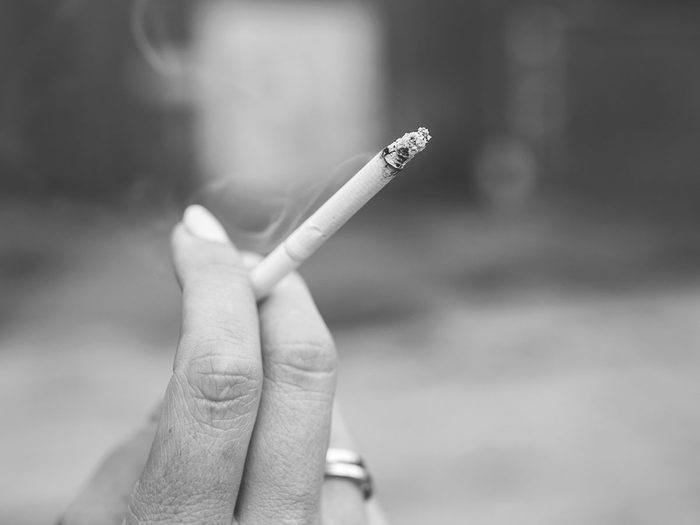
If you’re a heavy smoker
If so, your breathing is heavier, deeper, and harder, or you might try to catch your breath during the massage. (Here’s why quitting smoking will give you gorgeous skin.)
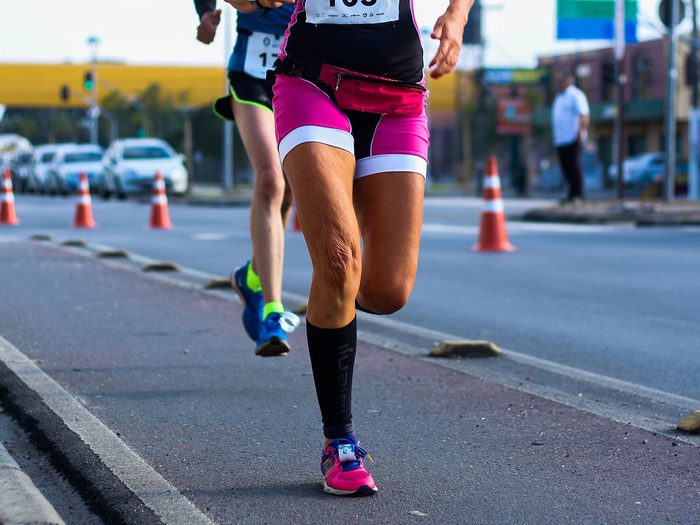
That you’re a runner
If you complain specifically about hip and foot discomfort, chances are you run regularly. The hips and low back will feel tight, and you also have tension in the bottom of the foot. We’ll need to stretch you in specific ways to help with the pain.
Medically reviewed by Michael Spertus, MD
Next, learn about the benefits of massage therapy.
